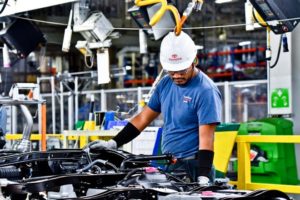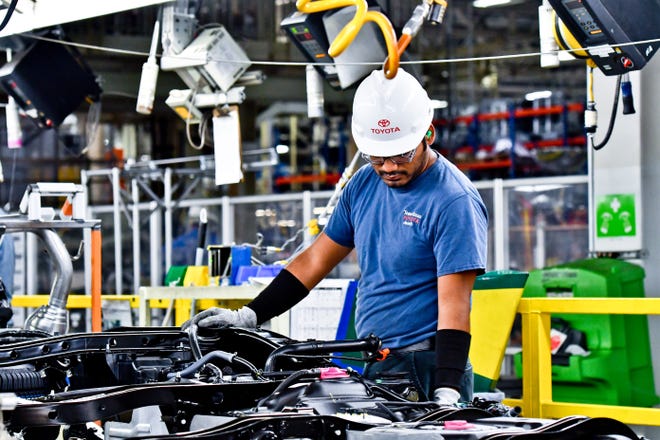 Employees work on the assembly lines at Toyota’s manufacturing plant in San Antonio in this file photo. The Texas manufacturing sector picked up steam this month, despite rising costs for raw materials and a tight labor market, according to a new report from the Federal Reserve Bank of Dallas.
Employees work on the assembly lines at Toyota’s manufacturing plant in San Antonio in this file photo. The Texas manufacturing sector picked up steam this month, despite rising costs for raw materials and a tight labor market, according to a new report from the Federal Reserve Bank of Dallas.
Factories in Texas are wrestling with rising costs for raw materials, supply shortages and difficulty hiring enough employees.
But those issues are partly byproducts of a trend that’s unequivocally positive — solid end demand for many types of manufactured goods as the coronavirus pandemic fades and the economy rebounds.
A key barometer of manufacturing activity devised by the Federal Reserve Bank of Dallas, called the state production index, expanded at a strong pace in June, picking up steam from May and signaling overall improvement in prospects for Texas factories.
“Expansion in the Texas manufacturing sector accelerated this month, despite soaring costs, widespread supply-chain disruptions and hiring difficulties,” Dallas Fed senior business economist Emily Kerr said.
Kerr said outlooks have brightened in the manufacturing sector — with a majority of manufacturing executives who responded to the Dallas Fed’s June survey anticipating higher levels of production six months from now — despite the constraints related to supplies and labor.
The production index registered 29.4 this month, compared to 15.7 in May and a monthly average of about 25.3 this year.
Positive readings indicate expansion, while negative readings indicate contraction.
In April 2020, the index plummeted to negative 54.9, its lowest point since compilation of the data began in 2004, including during the last recession from 2007 to 2009. It came in at negative 35.2 in March last year — when the pandemic first slammed the state’s economy — and at negative 26.9 that May, before turning positive and remaining so since then.
“Business is good—very good,” an executive of a primary metal manufacturer told the Dallas Fed in its most recent anonymous survey, conducted June 15-23. But “inflation is real and here now.”
The executive said wages for the factory’s employees and prices for its products have been increased twice this year already, with “very little pushback from customers as they and our competitors are all experiencing the same problem.”
The Dallas Fed uses anonymous surveys to compile its monthly barometers of conditions in the manufacturing sector.
Its raw materials prices index, a measure of the rate of change in input costs for Texas manufacturers, hit an all-time high of 80.8 in June, breaking a previous record of 79.9 set just a month earlier and a sign of fast-rising expenses. Likewise, the Dallas Fed’s wages and benefits index in the manufacturing sector hit an all-time high of 48.1 in June, an indication that compensation for employees is increasing quickly.
“We need 30 more employees, and there are none to be found,” an executive of a fabricated metal manufacturer told the Dallas Fed in its latest survey. In addition, “steel prices have tripled, and other supplies are hard to find.”
The factory has been able to offset some of the issues by raising its own prices, however, because “nobody is complaining,” the executive said.
Still, a number of manufacturers told the Dallas Fed that the myriad issues are constraining their operations and hurting business.
“Supply-chain issues and delays remain on nearly every front,” said a respondent to the June survey who works for an electronics manufacturer.
“Wages are increasing rapidly, and material costs are going up, which is forcing price increases on existing orders both to our customers and from our vendors,” the executive said. “Lead times are extending, forcing rescheduling to products that can be built with the materials available rather than building what has been ordered.”
Such changes “decrease efficiency on top of paying more for labor and materials,” the executive said.

